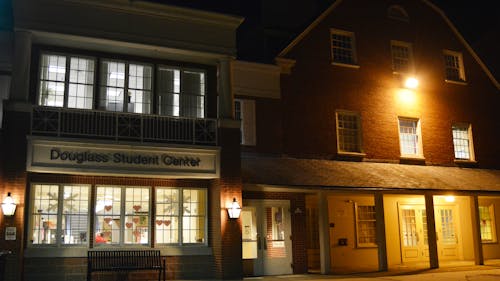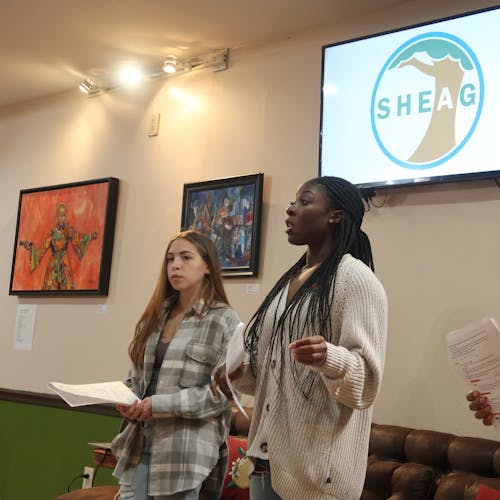Department of transportation works on proposal for new bus stop on Douglass campus

Rutgers University’s Department of Transportation Services (RUDOTS) ceased using the Cooper Dining Hall bus stop on Douglass campus in January.
The stop was re-implemented last fall in response to a request from New Brunswick, said Jack Molenaar, senior director of RUDOTS.
“We used to have the Cabaret Theatre bus stop on Nichol Ave., and the City of New Brunswick didn’t want that bus stop because they said it was interfering with emergency response times on Nichol,” he said. “So we moved it to Cooper stop on George Street because that’s where we used to stop prior to 2005. The city felt that that stop was also impeding traffic, and they requested us to not use that stop anymore either.”
The first bus stop for students going to Douglass is the Red Oak Lane stop near the Douglass Parking Deck. RUDOTS is working on a new master plan, which includes a proposal to put a bus stop on George Street near the Douglass Student Center, Molenaar said.
Right now, buses cannot turn right from Dudley Road onto Nichol Avenue because the intersection is not large enough, he said. As a result, buses only drive in one direction when approaching the first few Douglass campus stops.
The plan will call for expanding the intersection between the two streets, which will allow buses to turn right onto Nichol, Molenaar said.
The new bus stop would be at the parking lot behind the Douglass Student Center, he said.
“In fact, we use that (location) as a bus stop during Rutgers Day,” Molenaar said.
The master plan is not yet finalized and there is no set timeline for building this new bus stop.
“(We) always put these things in (the plan) saying ‘this is what we want to do. What would be the biggest thing, what will help students get around campus the most?’” he said.
The master plan will also help address traffic issues that prevent buses from moving between campuses easily, he said.
The buses themselves are always kept up to state standards to ensure their safety and reliability.
While it might seem that another bus has broken down every day, there have not been any abnormal breakdowns or an excessive number of incidents, said RUDOTS Manager of Transit Services John Karakoglou.
“First Transit takes really good care of their buses. They go in for their 5,000, 10,000 and 15,000 mile routine maintenance, and then twice a year (the state Department of Transportation) comes out and inspects our buses,” he said. “New Jersey is not going to allow these buses on the road if they aren’t safe.”
The buses also have their brakes checked every 30,000 miles and have their oil changed every 5,000 miles, Karakoglou said.
The buses are regulated to ensure they are safe to be on, he said. While some buses may break down or develop mild issues from time to time, the worst case scenario is that they will have to pull over to the side of a road and wait for a mechanic to take a look.
Rutgers has an on-call mechanic who can drive to any of the campuses to visit a bus which might have issues, Karakoglou said. The mechanic is available 24 hours every day.
“We have a maintenance truck that’s on-site all the time, so if a bus has a windshield wiper problem, any kind of road issue, anything we can deal with on the road we have a mechanic … who can come out and assist the buses,” he said.
The mechanics respond to between five and 10 calls every day on average, Karakoglou said. Often a bus driver will call them in just to make sure there is no issue. Very rarely is a bus taken out of service due to a breakdown.
Usually a mechanic can fix whatever issue a bus has on the road itself, allowing it to run relatively quickly.
“We have, during peak times, 48 buses on the road,” he said. “We (also) have about 10 buses that are spares. Out of these 10, these can be in the garage for many things. They can be in for a major overhaul to a DOT inspection to a tire change.”
The buses are rotated into and out of service based on a preset schedule, Karakoglou said. Usually between two and three buses are taken out of service for maintenance, repairs and state inspection.
The state inspectors will take a few days looking over every facet of a bus, he said.
“They’ll check the brakes, the tires, the lights, anything you can imagine on the bus to make sure it’s safe,” Karakoglou said. “They’ll go through every single bus and no bus gets a sticker unless it’s in good operating condition.”
Nikhilesh De is a correspondent for The Daily Targum. He is a School of Arts and Sciences senior. Follow him on Twitter @nikhileshde for more.



